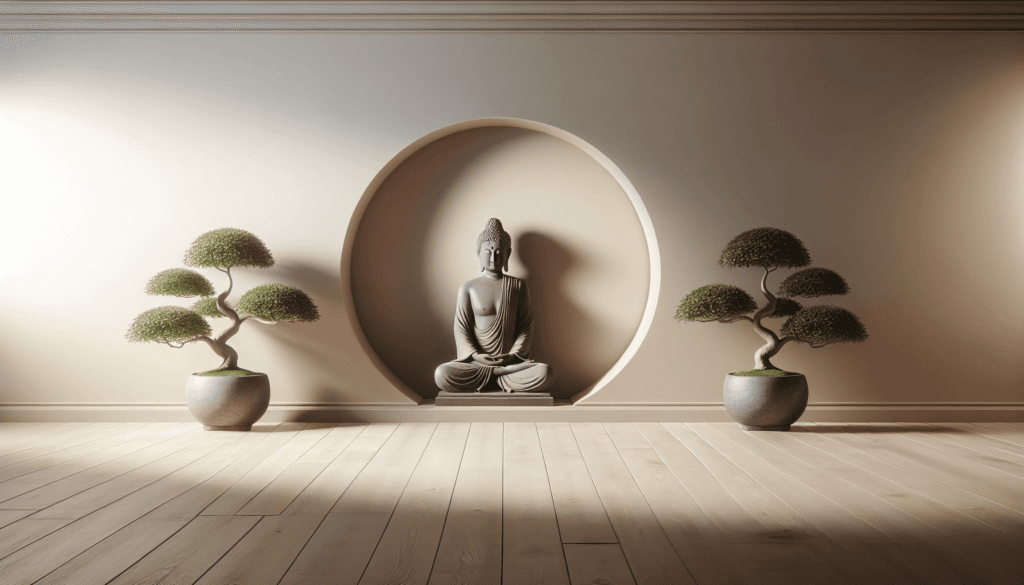Do you ever feel the need for a peaceful corner in your home where you can escape the hustle and bustle of daily life? Creating a Zen meditation space at home can be your sanctuary for calm and relaxation, a place where you can rejuvenate your mind and body.

What is Zen Meditation?
Zen, derived from the Japanese word “zazen,” means seated meditation. With roots in Mahayana Buddhism, this practice emphasizes mindfulness and simplicity. It’s a way to achieve peace and clarity by focusing your mind and breathing.
The Benefits of Zen Meditation
The benefits of Zen meditation can be profound and manifold. Primarily, it helps reduce stress and anxiety, improving your overall mental well-being. Over time, you’ll notice enhanced concentration, patience, and emotional resilience. Physically, it can lower blood pressure and improve heart health. By regularly practicing Zen meditation, you cultivate a sense of inner peace that profoundly impacts your daily life.
The Importance of a Dedicated Space
Why should you dedicate a specific space in your home for meditation? Consistency is key in meditation practice, and having a regular spot can make it easier to build and maintain this habit. A dedicated Zen space serves as a daily reminder of your commitment to mindfulness and provides a tranquil environment that supports deep, focused meditation sessions.
Choosing the Right Location
Selecting the best spot for your Zen meditation space is foundational. Ideally, this should be a quiet area where you won’t be disturbed. Whether it’s a corner of your bedroom, a dedicated room, or even a nook under the stairs, the location should be somewhere you feel comfortable and safe.
Here are a few things to consider:
| Consideration | Description |
|---|---|
| Noise Level | Choose an area away from TV, kitchen, or busy streets to minimize distractions. |
| Natural Light | Natural sunlight can enhance the ambiance of your space. |
| Size | It doesn’t have to be large; just enough to sit comfortably with necessary accessories. |
| Ventilation | Proper airflow can help maintain a fresh and inviting atmosphere. |
Essential Elements of a Zen Meditation Space
Creating a Zen meditation space involves incorporating several key elements that reflect the principles of Zen: simplicity, tranquility, and natural beauty.
Minimalist Decor
When decorating your Zen space, less is more. Clutter can be distracting, so aim for simplicity. Use only essential items that contribute to a calming environment. Think clean lines, neutral colors, and minimal furniture.
Natural Materials
Equip your space with materials that evoke nature. This can include:
- Wood: For warmth and organic beauty.
- Stone: To incorporate earth elements.
- Cotton: For cushions and drapery, providing comfort.
Calming Colors
Colors have a significant impact on our mood and energy levels. Stick to a soothing palette that includes earth tones like beige, brown, soft greens, and whites. These colors promote relaxation and a sense of grounding.
Comfortable Seating
Comfort is crucial for extended meditation sessions. While traditional Zen meditation often involves sitting on a zafu (a round cushion), you can use whatever works best for you, such as a yoga mat, a chair, or a meditation bench.
Enhancing Your Zen Space
Once you have laid the groundwork, you can enrich your meditation space with elements that foster a deeper sense of peace and mindfulness.
Plants
Integrating plants into your space can significantly enhance your connection to nature. They purify the air and add a touch of serenity.
Some suitable options include:
| Plant Type | Benefit |
|---|---|
| Bamboo | Symbolizes strength and flexibility. |
| Snake Plant | Easy to maintain and purifies air. |
| Peace Lily | Promotes a restful environment and improves air quality. |
Aromatherapy
Fragrances have a profound effect on the mind. Using essential oils or incense can create a more immersive meditation experience.
Examples of beneficial scents:
| Scent | Benefit |
|---|---|
| Lavender | Reduces anxiety and promotes relaxation. |
| Sandalwood | Enhances meditation focus and grounding. |
| Peppermint | Improves concentration and mental clarity. |
Sound
Finally, sound can play a crucial role in your meditation. Gentle instrumental music, nature sounds, or a small water fountain can help drown out distracting noises and deepen your meditation practice.
Creating a Routine
Now that your space is ready, consistency is vital. Developing a meditation routine can help you build a strong, rewarding habit.
Timing
Choose a time of day that works best for you, and stick to it. Whether it’s morning, afternoon, or evening, having a set time helps integrate meditation into your daily routine.
Duration
Start with a manageable duration, such as 5-10 minutes, and gradually increase as your comfort and focus improve. There’s no rush; the quality of your meditation is more important than the length.
Guided Meditations
If you’re new to Zen meditation, guided sessions can be incredibly helpful. There are numerous apps and online resources available that offer professionally guided meditations.
Maintaining Your Zen Space
Maintaining your Zen meditation space is crucial for sustaining its calming environment.
Regular Cleaning
Keep your space clean and clutter-free. Regular dusting and tidying will help maintain its serenity. Consider using natural cleaning products to avoid introducing harsh chemicals.
Refreshing Elements
From time to time, you might want to refresh the items in your space. This could mean changing the plants, trying new essential oil scents, or rotating the decor while keeping the aesthetic minimal and soothing.
Conclusion
Creating a Zen meditation space at home doesn’t require extensive resources or space. It’s about crafting a personal sanctuary that fosters peace, mindfulness, and health. By considering location, essential elements, and enhancing features, and adopting a consistent routine, you’ll be well on your way to experiencing the profound benefits of Zen meditation.
Your tranquil corner within your home awaits—an invitation to pause, breathe, and rejuvenate every single day. It’s a powerful reminder that peace can always be found within, one mindful moment at a time.
